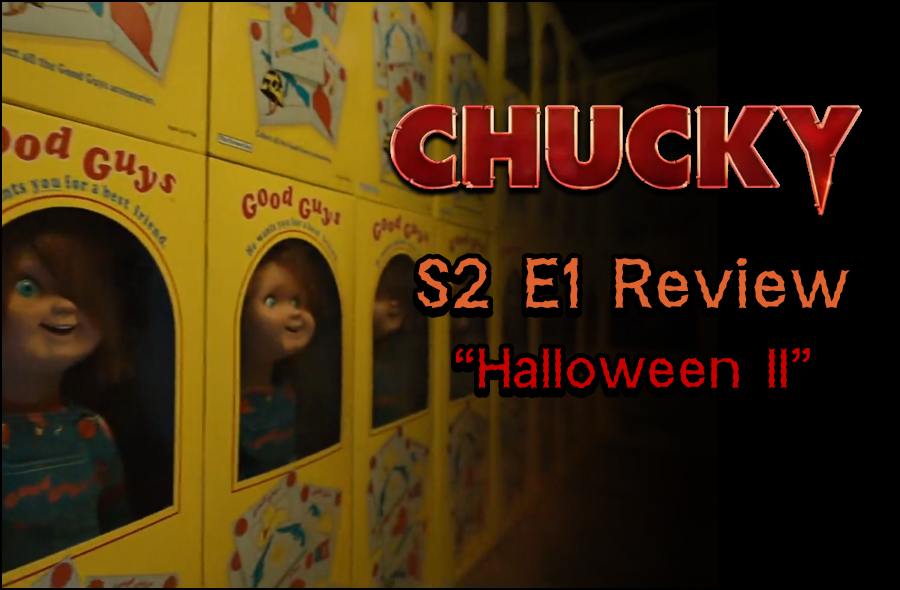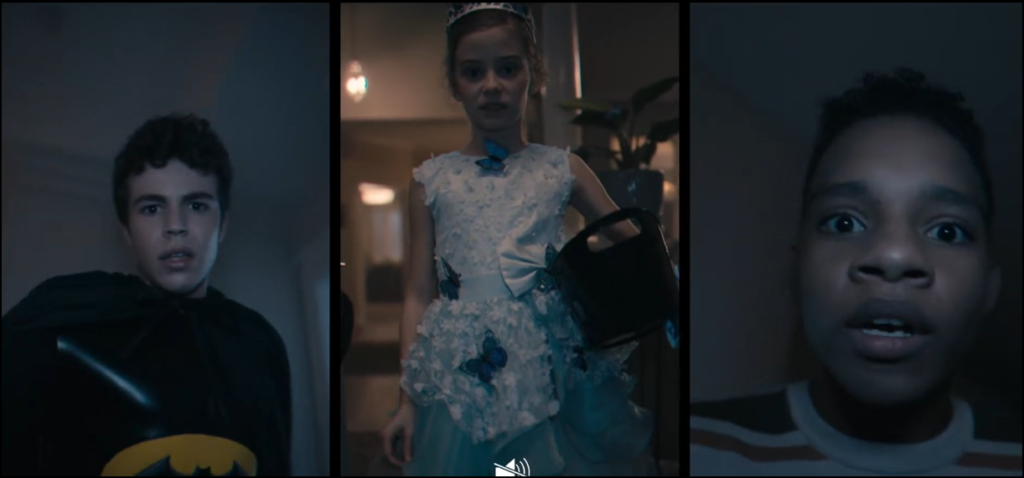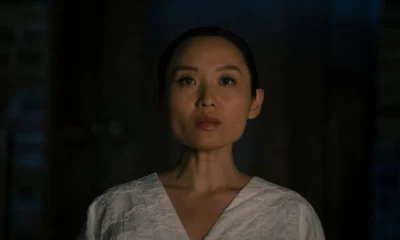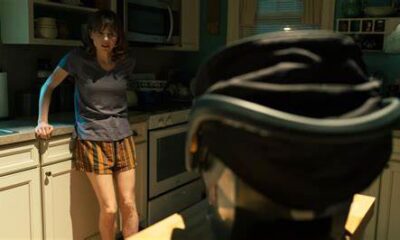
Chucky – S2 E1 – “Halloween II”
Welcome back to Haunted MTL’s continued coverage of the Chucky franchise as we tackle Chucky – S2 E1 -“Halloween II.” How have the Chuckybusters fared in the aftermath of the Hackensack movie theater massacre at the end of season one? What is the fate of Andy, Tiffany, and a truckload of Chuckies? And what is with all the Catholic iconography in the previews for this season?
Let’s find out, sweet faces.
Chucky – S2 E1 – “Halloween II”
Chucky‘s second season starts with a bang, boom, and bump as the aftermath of last season’s massacre weighs on our young protagonists. However, the Chuckybusters reconverge after a startling series of phone calls.
Chucky airs Wednesday nights on SyFy and USA.
How Was It?
“Halloween II” doesn’t offer as much Halloween dressing as last season’s seasonal episode. It does make for a fun introduction to this season’s stakes and setting. The episode picks up the pieces established at the end of season one, carries forward a bit, and introduces a radical and shocking new status quo for Jake (Zackary Arthur), Devon (Bjorgvin Arnarson), Lexy (Alyvia Alyn Lind), and even little Caroline (Carina Battrick).
Jeff Renfroe directs the story, written by Don Mancini. Kim Garland continues to serve as the story editor. Renfroe’s direction is solid here, having had a less chaotic episode to manage than his previous episode, the season one finale. Many of the hallmarks of a good Chucky episode continue to be carried through his direction. One touch is a trick-or-treat sequence that evokes Chucky’s doll’s eye view. There is a sequence with a rather rough spot involving one of several Chuckies (Brad Dourif) climbing along the roof of a delivery van – but for TV, it works. However, the budget restrictions are pretty obvious.
The episode’s most inventive sequence, however, involves the simple technology of a video call as three phone screens are shown simultaneously with two horrified, traumatized kids looking at a potential murder-in-progress and unable to do much about it. A mute button hasn’t been scarier. The direction here is excellent.

Continuing Developments
The writing is excellent, and the fact that Mancini was willing to go for such a surprising kill means that this show will likely continue to push some boundaries. Speaking of pushing boundaries, the writing around the kids continues to be excellent, and their different approaches to trauma will make for compelling storylines. Of the three, I think Lexy has the most exciting trajectory at the moment, and the depths of her trauma make her a ticking time bomb of bad choices. Thankfully it appears that despite how she treated Jake in season one, her trauma bond with him and Devon will be a necessary lifeline.
Of course, there are critical storyline updates worth noting. Nothing that I want to spoil here. A specific legacy character’s fate is up in the air. Also, a toxic parent continues to be toxic. Plus, the reappearance of last season’s psychiatrist, Dr. Mixter (Rosemary Dunsmore), raises some questions.
However, I am most intrigued by the casting of a particular character at the end of the episode. “Halloween II” has Lara Jean Chorostecki (Hannibal‘s Freddie Lounds) joining the Chucky franchise. I could not be more excited to see her.
 (5 / 5)
(5 / 5)
Chucky – S2 E1 – Kill Count and Spotlight
The kill count is a bit trickier in this episode. How many parts of a single serial killer do you count in a body count anyway? Plus, the fates of a couple of characters are left ambiguous at best.
This episode racks up one body. It’s not a big body, but it is certainly a shocker. Or perhaps more to the point, the consequences were explosive…
Seeds of Chucky
As always, each review features some notes on references and continuity in the whole Chucky franchise.
- So one of the big horror nods of the night was Scream (1996) with the episode’s scariest setpiece. I also got a little nod to 2020’s Host.
- In this episode, Chucky makes his best Boris Karloff impression. Brad Dourif can show a little more vocal range in his Chucky performance.
- Not much time with Tiffany and Andy in this episode following the season finale. We do get a sort of resolution to the delivery truck cliffhanger from season one.
- The Batman and Robin references for Jake and his new foster-brother Gary can be seen as a subtle reference to the mistaken belief that the Batman and Robin relationship during the whole Seduction of the Innocent era had a homosexual context. That book nearly killed the comic book industry in the United States.
- There is something weird with Chucky, given how much soul-splitting he has done. Is his memory slipping from his essence being spread thin… or is Charles Lee Ray getting old?
- We get a reference to Chucky Goes Psycho, the movie within Seed of Chucky (2004). That introduces Jennifer Tilly, the in-universe actress, to the franchise.
- We also learn the name of the doll that would become Tiffany in Bride of Chucky (1998). She is a limited edition doll named “Wedding Belle” – cute and terrifying.
- How many of the 72 Chuckies are left, anyway?
- Bless the return of the taser.
- Do we count that kid’s costume as a Pennywise nod?
- I don’t think Uber will want to use this episode for marketing purposes.
We’re continuing to cover the Kids’ Stuff – A Chucky Podcast show. However, unlike these written reviews, our discussion show contains plenty of spoilers. If you missed the latest Kids’ Stuff about Child’s Play 3, you could listen to it wherever you get your podcasts.
Movies n TV
Wheel of Time A Question of Crimson Is a Political Espionage Delight
Episode two of Wheel of Time felt like the beginning of a long journey. Stories are unfolding, lives are changing, and blood is spilling.
Let’s discuss.
The story
We begin this episode in the past with Elayne’s mother, Queen Morgase. It turns out her rise to the throne was a bit, shall we say, cutthroat. So when she shows up at the White Tower, Siuan is concerned.
She might have reason to be, too.
Meanwhile, Rand, Egwene, Moiraine, Lan and Aviendha are in the Spine of The World. As they travel through some of the most breathtaking lands I have ever seen on a TV show, Egwene is plagued with nightmares. We think at first that’s just her trauma working itself through her system. But we soon find out that it might not be that straightforward.
Finally, Perrin returns home to heal after his hand is almost cut in half. But when he gets there he finds the town has been infested by Children of The Light. And they’re looking for him.
What worked
There was something heartwarming in this episode about political espionage and choking religious persecution. And that is Elayne’s relationship with her family.
I have consumed a lot of fantasy content with royal families. And I have never once heard a princess call her mother ‘Mum’. I’ve never seen royal siblings get along. And I have sure as hell never seen a princess have a good relationship with her step-parent.
This was refreshing. Even though Queen Morgase is kind of a horrible person she seems like a good mother. And that’s an unexpected delight.

Of course, this is just one storyline among many. And while this can sometimes be overwhelming, in this case it wasn’t.
I’ll be honest, some of these storylines are going to drag for me. I know this because I’ve read some of the Wheel of Time books and I have an idea that not all the characters exactly pique my interest.
No one likes all the characters. No one likes all the storylines. While I am here for the political espionage between Queen Morgase and Siuan, not everyone likes it. While others might be fascinated with Selene trying to win Rand back, I couldn’t care less.
Having multiple storylines keeps everyone’s attention better. So long as things don’t get out of hand. Things can easily get out of hand. But this seems to be managed well.
So far.
What didn’t work
As I mentioned above, I’m not thrilled with Rand’s story at this point. And while it’s fine to not like a storyline when there are this many to choose from, it’s not fantastic that the one I like the least is the one involving our two main characters. And anytime we were with the team at the Spine of The World, the only thing that brought me joy was Moirain’s hat. It reminded me of Stockard Channing’s hat in Practical Magic.
The problem is that Rand is Charlie Brown with controversial magical powers. He is boring, serious, and pessimistic.
And yes, I understand that he has a heavy emotional burden and he’s the Dragon Reborn and that’s quite taxing and all. But let’s be fair, there isn’t a single person in this show that doesn’t have a heavy burden. And most of them manage to be fun occasionally.

All that being said, this episode of Wheel of Time did exactly what it needed to do. It set up conflicts at each of the three locations. It established emotional ties between the characters and the events. And it established goals for everyone.
This was, in short, a solid episode. Not groundbreaking, not mind-blowing or life changing. It was simply good. It was entertaining and moved the plot forward.
Well done.
 (3.5 / 5)
(3.5 / 5)
Movies n TV
Wheel of Time Returns With A Bang
Wheel of Time is back for season three. There are mixed feelings regarding this. Last season, there were some serious pacing issues. And some serious sticking to the book’s storyline issues. But we’re two seasons in, and we don’t give up so easily. So let’s dive into episode one, To Race the Shadow.
By the way, I highly recommend watching this episode with the subtitles on. You’ll see why.
The story
We begin this episode with Liandrin facing a trial of sorts for her rampant betrayal. She does her best to gaslight her Aes Sedai sisters into thinking that Siuan Sanche is the real traitor.

When that doesn’t work, she reveals how many Black Aes Sedai have actually infiltrated the tower.
Spoiler, it’s a lot.
In the aftermath, our whole team gathers to drink and enjoy one night of relaxation before they head out to the Tear to form an army for Rand. All is going well until they’re attacked by myriad creatures and a sentient axe.
What worked
This episode was long. It had a run time of an hour and eleven minutes. And a lot of that run time was spent in heavy dialog scenes.
Fortunately, these were well-done scenes.
If you’re going to have a lot of talking scenes, there are good ways and bad ways to do it. Last season, we saw lots of examples of the bad way to do it. But this episode did it well. For one thing, other things were going on while conversations were taking place. The characters are drinking, playing games, walking through an interesting city. And the scenes themselves didn’t stretch out. They weren’t repetitive. We heard what the character had to say, then we moved on.
It was also nice that the point of these scenes wasn’t just info dumps. We had character development. We had romantic interactions. We had plot development and foreshadowing.
Overall, this episode felt like what it was. A moment of calm before a storm.
Taking a step back, I’d be remiss if I didn’t address the fight scene at the start of the episode. Because it was epic.
The magic looked amazing. The martial arts that went along with it looked fantastic. The costumes were beautiful. It was just incredibly fun to watch.
More than that, it was emotional. We lost some characters in that fight that were important. And it was clearly emotionally shattering for many of our characters, who found themselves betrayed by people they trusted.
So many of them.
It was a great way to open the season.
What didn’t work
Despite that, this episode wasn’t without its flaws.
First off, there were a lot of dialog scenes. And they were good scenes, as I’ve already discussed. But it was one after another after another. And when your episode is, again, an hour and eleven minutes, it’s maybe a little much to have so much chit-chat. Couldn’t some of these conversations, important as they were, have been moved to maybe another episode?
Finally, I want to talk about Egwene’s travel through the arches.

I feel like maybe there were some deleted scenes here. Because there must have been more to that visit than what we saw, right?
We could have seen Egwene battle Rand. That would have been badass and emotionally devastating. We could have seen her with a quiet life with Rand back home at the Two Rivers. We could have seen anything except for the quick clip of Rand in a bloody river, followed by Egwene being shoved back out in a bloody shift.
Bad job. But at least it wasn’t an extended scene of Moiraine collecting bathwater, and then taking a bath while looking sad. If we’d started this season with another scene like that, it might have broken my brain.
Amazon dropped the first three episodes at once. So we’ll be back soon to talk about episode two. See you then.
 (4 / 5)
(4 / 5)
Movies n TV
Entertaining as hell: Eight Legged Freaks (2002) Review
Early 2000s is a special era for the industry. It accepts the cheesiness and corniness of movie making, in turn producing some gems in their own right. Eight Legged Freaks starring David Arquette and young Scarlet Johanson is a horror comedy about giant spiders who overtake a small town. As crazy as that premise sounds, the movie surprisingly has a ton of heart and is super entertaining. Let’s review, shall we?
Plot
We start Eight Legged Freaks with a shot of toxic waste spilling into the water supply of Joshua, a spider farm owner. He is friends with Mike, one of our protagonists, who is a science geek and a spider enthusiast. Mike notices something quite right upon visiting Joshua, but no one takes him seriously. We are then introduced to the rest of the crew. Mike’s mother Samantha, the town sheriff, is too busy chasing Ashley, his sister, who is dating the town mayor’s son Bret (something Samantha does not approve of). We also have Chris, who returns to the town to save his father’s legacy in the town mines. He has opposition from Wade, Bret’s father, who wants to use the mines for his business ventures. Lots of drama going on that will only get juicier once the spiders get loose.
The creepy crawlies quickly dispose of Joshua and make their grand appearance after Ashley rejects Bret’s advances, abandoning him in the middle of a desert. A glorious chase sequence ensues as the spiders make their way towards the town, wreaking havoc on its residents. In a true horror fashion (which the movie acknowledges), it takes some convincing from Mike and then from Samantha for the town to take the threat seriously. The tongue-in-cheek style of narrative adds the comedy aspect to a movie that would otherwise burn out fairly quickly.
The remaining characters hide out in a shopping mall as it’s the only somewhat sturdy building in the area. This doesn’t last long as the spiders break in, forcing them to run through the mines. Their resources to fight the creepy crawlies off are limited as the methane gas doesn’t allow them to use firearms. Such conditions require resourceful thinking from Chris, who uses perfume to fend off the leader of the spider group and save himself during the climax of the movie.
Character dynamics are not forgotten once the action kicks in. We have Chris confessing his long-term feelings for Samantha which she knew all along, which provided some comedic relief. Bret also reunites with Ashley and apologises for being an asshole. Mike finally gets the appreciation he deserves as his knowledge saves the townsfolk more than once during the whole ordeal.
We end the movie with the town’s radio show person telling the story as an urban legend during his segment. This brings it into question – how much of it happened the way he said it did? We can only guess…
Overall thoughts
Eight Legged Freaks is a fun creature feature with some self-aware commentary on genre tropes that doesn’t take itself too seriously. The acting is good, the pacing fitting and the characters are likeable enough for you to want them to make it through. Definitely a must watch, if you don’t suffer from arachnophobia, that is.
 (5 / 5)
(5 / 5)













